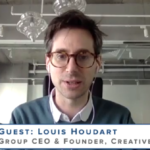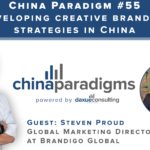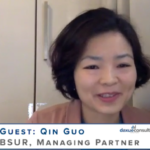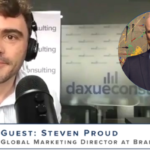Podcast Transcript #62: A creative agency with a focus on food and beverage branding in China
Find here the China Paradigm 62. If you work in the F&B industry in China, then this episode will probably be useful to you as we will discuss all the main opportunities and challenges of food and beverage branding in China.
Matthieu David:
Hello everyone. I am Matthieu David, the founder of Daxue Consulting, a strategic market research company, and this podcast, China Paradigm. And today, I am with Ben Weldon. You are the co-founder of Thread Design, a Shanghai-based branding agency. You said proudly based in Shanghai. And that’s something I like to talk about. You founded the company in 2006. Before that, you had worked in a company called GURUS where I feel you got the understanding of how the Internet and the digital economy were going to change branding.
And after two years, while traveling the world, you started your business in 2006. You said it was by accident. That’s also something I would like to understand. So, you co-founded the business with someone who is specialized in food and beverage and had been a consultant in the food and beverage industry. Maybe, we will talk more about it. That’s why your Shanghai-based branding agency now is still focusing on food and beverage branding in China. So, you have worked for brands that we know are based in Shanghai, like Saigon Mama, Boxing Cat, and so on.
So, thank you very much for being with us. And as always, my first question is about the size of the company, to give an insight to the listener about where you are in terms of development.
Ben Weldon: Hi Matthieu. Good morning. Thanks for having me on your show. Yeah. And thanks for the intro. So yes, to start off with the size of the company, we’ve had ups and downs over the years. We started in 2006. At our biggest, we were 26 people and had offices in Beijing and Shanghai. And in 2014/15, we shrank back down. And so, now we are 12 people. We’re turning over around ¥10M a year. And I am pretty happy here in the former French Concession.
Matthieu David: I interviewed someone who was managing a branding agency. Actually, she is managing another one. I think they are a part of you as well. And she was telling me that revenue was going up and down. I mean the growth is not sustainable. As you have been in business for certain years, what’s your feedback on this and stability of food and beverage branding in China? How do you manage it? It shouldn’t be very easy.
Ben Weldon: Yeah. Unfortunately, it’s the ebbs and flows of a service business, especially in food and beverage branding in China where a single project might be 10% of your turnover for the year. And projects can take three to six months to close. So, you may only have one or two things in your pipeline. You may only be running five projects at a time. We’ll win and lose projects. So, if you kind of win or lose a couple, that can be half your turnover or double your turnover. You just have to knuckle down in the good times and not get distressed in the bad times. Yeah, there would be times when you’re looking at your forecast and just thinking, “Oh my God, how are we going to make it?” And then, two weeks later, you will be scrambling for freelancers to help you out.
Matthieu David: Do you think that focusing on food and beverage branding in China is actually a solution to deal with the changes in business? Because when you are specialized in one specific segment, people will always think about you when they are in that segment or deal with a segment of food and beverage.
Ben Weldon: Yeah, exactly. I mean specializing in food and beverage branding in China was, I guess, our own decision. Branding is all about being memorable for something and having a niche. There are a couple of reasons you might want to specialize. For us, it’s easier to be recognized. People remember you when they think of food and beverage. And also, in a small agency, to be a niche in a service can be an issue because you are then just outsourced to by bigger companies. For example, if you just do app development or WeChat management, you don’t own the client relationships. So being a specialist in food and beverage branding in China allows us to work directly with the clients rather than being partnered with bigger companies.
Matthieu David: So, you just said branding is to be memorable for something. And one of the questions we had when preparing the interview was what the definition of branding is? We see a lot of people doing branding. They say they do branding, but sometimes they do marketing. They say they do marketing and sometimes actually do proper branding. I feel the definition of it is not very clear. I think I read on LinkedIn or maybe another website on brand strategy and brand experience if my memory serves me correctly. Could you explain those two concepts which are the strategy and the experience and why you distinguish them?
Ben Weldon: Sure. I mean, I guess there are different types of Shanghai-based branding agencies and it depends on the size and experience of the agency. So, it really kind of falls into two parts to the brand strategy. That’s everything before you start the design work. And now, you see a lot more often that there’s a crossover into business consulting. So, companies like Accenture and KPMG are doing a lot more brand strategy because there is this crossover with business strategy. So, what’s the reason you have a business? What’s your purpose? What’s yours why? And this is sort of the start of your brand strategy if you like.
And that will continue all the way up to what your content strategy might be and what your marketing strategy might be. And then you have the crossover into brand execution. So, this is where the creative starts. So, there’s a crossover area we call creative strategy. It entails thinking of what the brand is and what the avenues would be for that. And then this goes into all of the places where your consumer interacts with your brand. So that’s your visual identity, but it could be your website. It could be your e-commerce pages. And although we don’t do the digital strategy, we would do the creative strategy and initial designs for it.
Matthieu David: Yeah, I feel the split is not very clear sometimes when you need to deal with a Shanghai-based branding agency or a marketing agency. On your website, you mentioned that you are using lots of workshops, research, and insights. I believe it’s more for the strategy part. Could you talk a bit more about why it’s useful and how you use it more specifically? Because I feel a lot of people who are talking about branding say that they want to find back the core values, the core identities, or the initial identity of the brand. And on the other hand, there is a lot of research and insight that are specific on changing it, changing a core value, changing the identity, or change, maybe, the initial reasons or existence of the brand. How do you with the origins of the brand? What do you need to keep or change during the brand strategy?
Ben Weldon: Yeah, I mean I guess it depends on the type of client and the type of project that we’re dealing with. A lot of what we do is market entry. And so, then the research and insights might be to look at the competitors, what’s happening in the market for the market entry, understanding China, and understanding the consumer. Those things really just help the client understand what is and what isn’t going to be important about their brand. For the brand itself, it wouldn’t necessarily change. In fact, especially in an established brand, it shouldn’t change. It would just help them focus on the right parts of their message that are going to be relevant to their customers.
Matthieu David: Okay. So, would it be fair to say that part of the research is to know what not to say and to focus on what is most important because you have limited space and time to communicate with the user’s clients?
Ben Weldon: Yeah, that’s a sort of perfect way to put it. Not saying the wrong things is often more important than saying the right things.
Matthieu David: Would you like to detail some cases you have been working on which revealed what you’ve just said is the definition of brand strategy and then its Chinese brand strategy execution? I mentioned some of the cases you have on your website, but would you one which conveyed this message of extrapolating the brand strategy within the experience?
Ben Weldon: Yeah, I think a really amazing example has been working with Aldi. So, Aldi has just entered the Chinese market. I’m sure many people have seen this in the news. So, we’ve been working with this brand now for about three years. And the path from strategy to Chinese brand strategy execution has been very long and very in-depth. So, they started many years before they entered the China’s market with major international research companies. Obviously, not us. And they have used this insight over a number of years to really change what their business will be for China’s consumer. So, when you go into their stores here, it’s nothing like their stores in Europe or internationally. And although at their core, they’re still the same company, they still have the same values, they will still use the same processes to make them competitive in the market that they do elsewhere, their strategy to be different and be relevant to the consumers here is unique for the Chinese market.
At the end of that, when it comes into the Chinese brand strategy execution side. So, where we’ve been involved with a lot recently is all the touchpoints that you see in the new stores. So again, these are different from what you see internationally. The type of photography used is different. They have digital menu screens that you don’t see internationally. So, all of this photography, execution, design, menu, and psychology come under brand execution.
Matthieu David: How different is the identity of Aldi in China with that in the West? What was the strategy initially? I understand the digital menus and the story was very different. But what was initially behind the idea which led to the change?
Ben Weldon: I think what’s really interesting to them is their value proposition internationally doesn’t really work in China. What the research showed here is that the local consumer wants premium products but they don’t want to pay the price that you would see in city supermarkets and these kinds of international supermarkets. They also don’t have a huge range of products. And so, their strategy here has been handpicked for you. So, this combines why they have a smaller range of products and also the high quality that they can offer for them.
Matthieu David: I understood that they started with e-commerce first and then opened shops. You worked in the shops, right? Not on the e-commerce part.
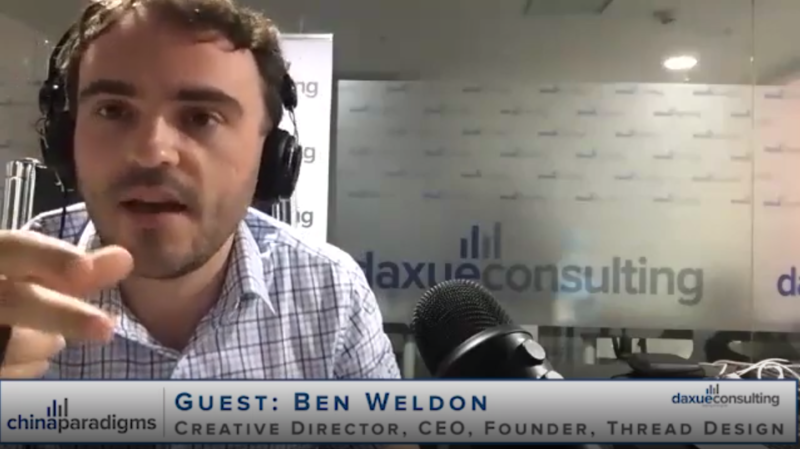
Ben Weldon: Yeah, for some time, we were working on e-commerce as
well.
Matthieu David: Okay. In the context of China where we see that
e-commerce is taking so much market share—we saw what happened to all those
players who are major players in brick-and-mortar retail—what’s your lesson
from this case and, generally speaking, from your experience of O2O branding in China between e-commerce and stores in relation to the brand
interaction with the consumers?
Ben Weldon: With a brand like Aldi, obviously, it’s very different because they don’t have e-commerce internationally. So, everything that they’re doing here is new.
Matthieu David: I see.
Ben Weldon: But I think any brand coming into China, especially when they’re on Tmall or JD.com, it’s a big shift for them. They have to make these enormous product description pages. The consumer here wants to know everything about the product and where it came from. It’s a challenge but it’s also a great opportunity because you have these long pages where you can bring the brand to life. So, you’re not just detailing points, but you can also bring in your brand values and brand story into each of these kinds of 1-meter pages of content.
Matthieu David: So actually, what you are saying is that even the e-commerce in itself is different from the West. The way you design your product and interact with the customer is much more detailed, much more complete, and much longer even for e-commerce. What about the store and offline presence, O2O branding in China? What’s the idea of being present offline as well to interact with the customers? You are in food and beverage branding in China so you are pretty much involved in offline presence. How do you feel about being in both e-commerce and offline store? What’s the reason for developing O2O branding in China?
Ben Weldon: I think being offline is still really important. To be a major player in this market, you need both online and offline.
Matthieu David: Yeah. For getting more touchpoints, what was the reason behind it?
Ben Weldon: I think people still like to browse. Grocery shopping is huge here online, but it’s still huge offline as well and there’s an opportunity in both. Just because online is popular, it doesn’t mean that people will stop shopping offline.
Matthieu David: Okay. Going back to some cases you have been working on, I saw on your website that you have been working for a very famous Chinese brand, Yonghe Dawang. Could you mention a couple of differences between Chinese brands and Western brands? You said you worked a lot on new entries, but that’s not the case for Yonghe Dawang which has been established for a while, I believe before you worked on them. Could you mention the differences between working on established Chinese brands and a new foreign brand in China?
Ben Weldon: Sure. Actually, at least, for what we do in Chinese brand strategy execution, I don’t feel there is a huge difference between the two. At the end of the day, the target consumer is similar. They both have their brand challenges and you’re still working through a similar process of strategy, brand, and Chinese brand strategy execution to help them reach and talk to their customers. At the end of the day, I really don’t feel there is too much difference between the two.
Matthieu David: Okay. What do you do for them? Yonghe Dawang is a fast-food restaurant. Maybe, you should mention to people listening to us what Yonghe Dawang is.
Ben Weldon: Sure. Yonghe Dawang is a Chinese QSR (Quick Service Restaurant). They are a fast-food restaurant and they’re famous for soy milk and these sort of long Chinese doughnuts that are very popular at breakfast time. So, for them, we’ve worked with them for a few years. We do a lot of their promotional cup designs—so bringing the brand to life for festivals, New Year, Golden Week, and so on. They change their takeaway packaging regularly. We also do digital menus for them. So now, it’s much the same as McDonald’s or KFC. The menu screens are a combination of video and animation. So, we create these, but also, we run the photo-shoots, the food styling, as well as kind of advising them on the psychology of the menu. So, it’s how to encourage upsell, how to encourage people to purchase combinations, and so on.
Matthieu David: I see. Why do you think such a company which has been in the market for a while would ask a foreign company to work on their food and beverage branding in China, to work on the card design, to work on the digital menus, to ask Thread to work on their creative or branding assets?
Ben Weldon: Actually, we were asked to pitch. They loved our creativity. They said that we were more creative than the other partners that they’d worked with. And that’s why they worked with us.
Matthieu David: Okay. When you pitch a client, I was kind of amazed at how much work it is to pitch. Does it mean that when you pitch, you need to already be creative at the pitch stage and to actually already disclose your ideas and your way of working?
Ben Weldon: So, with an advertising agency or especially interior design agencies, it’s really tough—and I feel for those guys—especially when they have a large budget where they also get the media spend or the development of the interior as well. So, these kinds of agencies do need to go in with full creative pitches. They’ll pitch the strategy. For us, we pretty much never pitch. We will pitch and approach—so how we will approach a project—and we’ll show kind of cases. And then, we’ll talk about our ideas. But unlike larger advertising agencies, we wouldn’t go in and sort of give an example of strategy and creative. For us, it’s the work that we do and it takes weeks or months to produce high-level strategy and creative. So yeah, giving it away in the pitch doesn’t make sense. And our clients understand that.
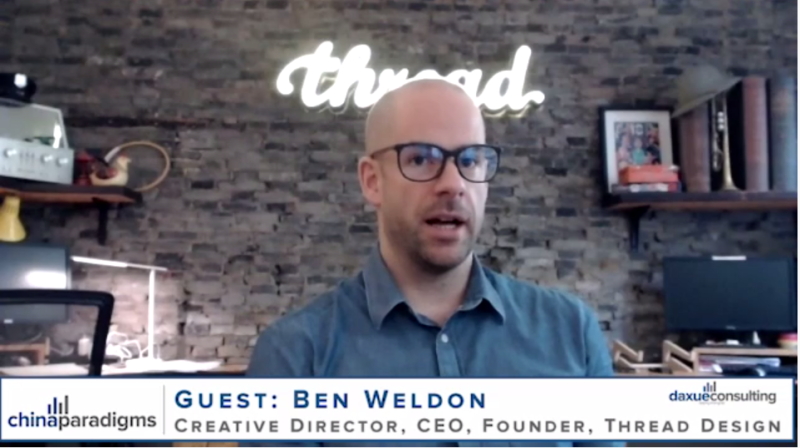
Matthieu David: Yeah. To elaborate more on this, I saw some pictures from a publicist and actually, it’s extremely long. And I think they spend weeks on those pictures. The feeling it’s giving is that they are giving too much away to the client even before they sign. So, I feel that could be an issue for smaller companies.
Ben Weldon: Yeah. When you take into account the amount of time that people spend on them, pitch budgets can be well over ¥1M for some companies.
Matthieu David: So, one key topic is about the competition. We just talked about some big firms. We said you have specialized in food and beverage branding in China. How do you deal with such a big competition? I feel there are many Shanghai-based branding agencies which are mainly relying on one or two creative people. How do you see this competition?
Ben Weldon: Sorry, can you rephrase your question?
Matthieu David: Yeah. How do you see that there’s so much competition in the market? How do you deal with so much competition where actually, it’s very fragmented for clients to see all those branding agencies which mainly—I feel but maybe I’m wrong—depend on the identity and the mindset of the founder or the creative person. How do you deal with this competition?
Ben Weldon: Yeah, I think one of the great things about Shanghai is there is a lot of competition here, but compared to a mature market like London or Paris or New York, there isn’t as much competition here as in the more developed markets. So, yeah, I mean it’s tough, but that’s business. But yeah, I still think there’s plenty of opportunities for everyone. And I think actually, there is something really interesting here that you don’t see back in London. I was talking to someone about this the other day. A lot of industries here have the owners of all the agencies in WeChat groups together. And we’re happy to share ideas. So, I know there is sort of founder-led branding agencies and we all chat and meet up for drinks. I don’t know about everywhere in the world, but in London, certainly, everyone is keeping their cards very close to their chest. They’re not sharing resources or giving references to a good web developer or production manager or signage manufacturer. So yeah, I think it’s a great place to be in business even with the competition.
Matthieu David: Do you feel that you are sharing together with
your ideas because you may be foreigners? You wouldn’t do that in London or in
New York because you are from the country. Do you think that’s the reason why
or it’s also with Chinese agency owners?
Ben Weldon: Yeah, I think that’s definitely why there is that
culture here. But certainly, there are also a number of Chinese owners in the
groups but perhaps more Western market focused. Yeah, I’d be interested to know
whether the Shanghai-based branding agencies are also all friends and sharing resources. I
don’t know the answer to that.
Matthieu David: Talking about managing a branding agency, when I go
through some of your clients—again, correct me if I’m wrong—I feel they may be
medium-sized or smaller- sized. For instance, I don’t know how big Boxing Cat is. At least, it began as a small
business in Shanghai. How do you work on the Chinese brand strategy execution for medium or small brands where it
doesn’t have like a two-decade or three-decade-old history? They don’t have
that many assets to work on. They may not actually have such a huge budget.
Ben Weldon: So, what tends to happen is the pieces of the process that you get to be involved in. So obviously, with a very large company, you may just be working on the branding process for maybe a single product or a single initiative. It may just be ‘please help us brand our internal employee retention scheme’ or something. And so, with these global Fortune 500 companies, you’re doing the same process but it tends to be on a smaller piece. You’re generally not doing their entire brand strategy. And then, for a smaller company, we still work on startups. It’s really enjoyable to work. It’s fun for the design team. But in those meetings, you’re spending half a day doing their entire brand architecture for them which these big companies spend years and millions on. Although the processes are the same, you’re just doing different things within that time.
Matthieu David: What would be the budget then if some managers of startups or medium-sized companies know they have an issue as a brand and they can gain something from brand transformation. What kind of budget should they think of?
Ben Weldon: Yeah, a sweet spot for us to be able to do something quite nice is about ¥250,000 in terms of the brand strategy piece. But the price is really varied depending on the type of Chinese brand strategy execution that you need or the amount of research that you need. I mean, some brands might spend a few million RMB on the research before they even start on the strategy. So there is really a kind of huge scale there.
Matthieu David: Working on their strategy, what would the brand
get? Will they get the PPTs? Will they get some designs? What would they
get from a strategy point of view on a document as a deliverable?
Ben Weldon: It’s difficult to go into details. I think the
best way to describe it would be clarity on what their brand is, their brand
voice, and a road map on where they’re going with it. After working with a
branding agency, you should come away pretty clear on who you are, what you’re
going to look like, what you’re going to say and who you’re going to say it
to.
Matthieu David: I see. Talking about managing your Shanghai-based branding agency, again, I believe one of the challenges is to hire creative people to manage creativity, which makes sense business-wise because it’s good to be creative. But if it doesn’t make sense business-wise or has no justification, then I believe you cannot make much out of that. How did you manage this creativity and talents?
Ben Weldon: It’s a good question. I mean my background is creative myself. So, I didn’t come from a business background. And I think creative people are always creative. So, you don’t need to try and make people creative. I think you just need to give them space and the environment to be creative in. If you start working people till 2 am or 3 am and there are some bad habits of very late nights and burning people out, I think that doesn’t allow people to be creative. So, we’ve always tried to run an organization here where people are much freer to work in the way that they want and have the space to be creative.
Matthieu David: Okay. Okay. Thanks very much for your time and for going through managing a branding agency and some cases in food and beverage branding in China. Thank you very much for your time. It was very instructive. I hope everyone enjoyed this talk.
Ben Weldon: Cool. Thank you very much. Thanks for having me on your show.
China paradigm is a China business podcast sponsored by Daxue Consulting where we interview successful entrepreneurs about their businesses in China. You can access all available episodes from the China paradigm Youtube page.
Do not hesitate to reach out our project managers at dx@daxue-consulting.com to get all answers to your questions


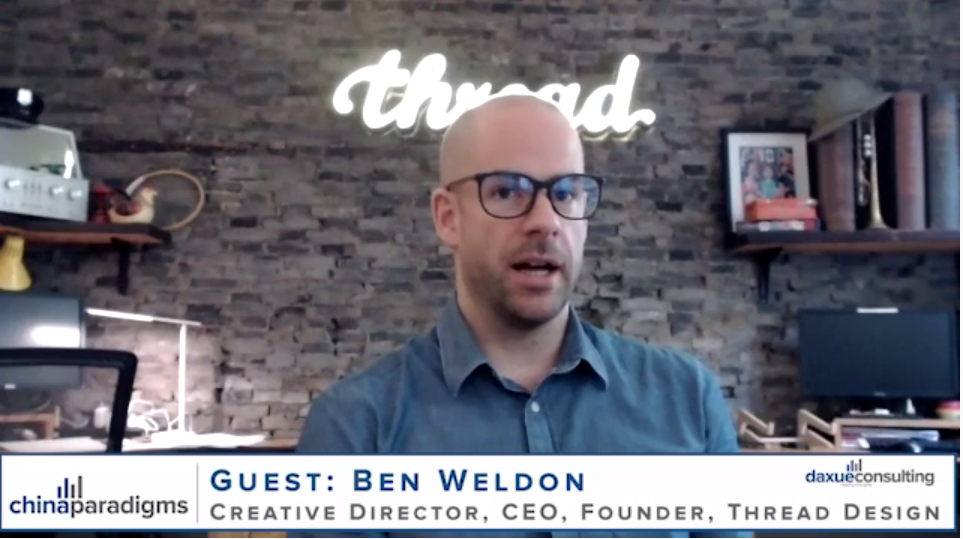


![[Podcast] China paradigm #14: How to run a creative brand consulting company in China](../wp-content/uploads/2018/12/Cover-Episode-14-150x150.jpg)
